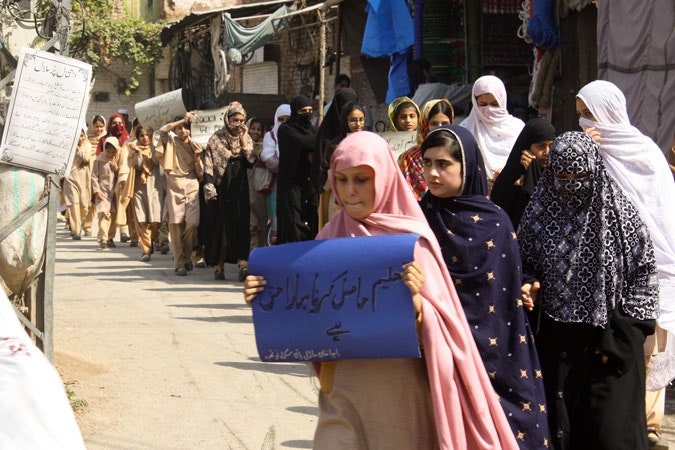Right to Education for Girls in Pakistan: Malala’s Struggle Must Continue
By Nargis Sultana

Pakistan has gone through moments of shock in the past. Catastrophic floods, assassinations and violent attacks have been all too common. Yet the attempted killing of a 14 year old girl whose crime was to seek fair access to education for girls in Pakistan has, many believe, marked a turning point. But we’ve been here before. Turning points will not happen simply through condemnation of the attack on Malala Yousafzai. We must ensure that those in power who speak out against the attack on Malala also commit to pursuing and securing girls’ education in Pakistan, now a fundamental right for the citizens of Pakistan.
The state of girls’ education in Pakistan is far from optimal. There are 7.261 million children out of school at the primary level, and 58 percent are female (UNESCO, Education for All Global Monitoring Report 2011). The Government has initiated a number of efforts to bring about improvements in education outcomes, particularly for the participation of girls in primary school. Pakistan’s efforts are linked to its commitment to meet the Education for All (EFA) targets and the Millennium Development Goals (MDGs). The recent constitutional amendment (Article 25A) makes education a fundamental right for the citizens of Pakistan. The article states “the State shall provide free and compulsory education to all children of the age of five to sixteen years in such manner as may be determined by law.”
The recent attack on Malala Yousafzai has shocked Pakistan and the world. Malala was well known for her education and women’s rights activism in Swat Valley, where the Taliban has at times banned girls from attending school. For many, Malala was a symbol of resistance against fundamentalism, extremism, and terrorism. As importantly, Malala was a symbol of hope for thousands of other girls in Pakistan going to school in often difficult circumstances. Malala spoke out against the Taliban insurgency by blogging about their ban on schools for girls in Swat. She wrote about the great loss having so many young girls out of education means for the future of Pakistan. Her writing was courageous and moving, and it shows that words can bring change.
The public reaction to the attack on Malala has at least been a cause for hope. Protests against the attack have been held in several Pakistani cities. Baacha Khan Trust Educational Foundation, (BKTEF) participated in the International Day for Girl Child in all 14 Baacha Khan Schools across Khyber Pakhtunkhwa and Federal Administered Tribal Areas (FATA). Four thousand students were involved and participated in organized walks and prayers for Malala. Along with their support for Malala, these students sought to highlight the importance of girls’ education and the need to secure a better future for the young girls of Pakistan.
Baacha Khan Trust Educational Foundation works for peace, democracy, human rights, and development with an emphasis on education, particularly for women and girls. Most of the students and teachers in the 14 Baacha Khan Schools are girls and women. The Baacha Khan Trust Educational Foundation works with women and girls in some of the most challenging areas in Pakistan through its Community Education Committees. Idara-e-Taleem-o-Aagahi (ITA) has also been active in its condemnation of Malala’s attack.
The Constitution of Pakistan promises free and compulsory education to all children in Pakistan. Malala Yousafzai asked for no more than this, for all of Pakistan’s children, girls and boys. Education must now be acknowledged as the first priority of the state and those political parties engaged in election campaigning. New legislation is needed now in all provinces and federal areas in Pakistan for the right to education, which comprehensively addresses issues of access, quality, and equity for all children of Pakistan. The legislation must explicitly define norms for quality education services, roles, responsibilities, and how the implementation process will work. The process must be transparent and inclusive and involve a nationwide debate and consultation. Attitudes in Pakistan towards education for girls are changing. Now the law must catch up with them and nudge them even further.
Nargis Sultana is a program officer at Foundation Open Society Institute-Pakistan.


